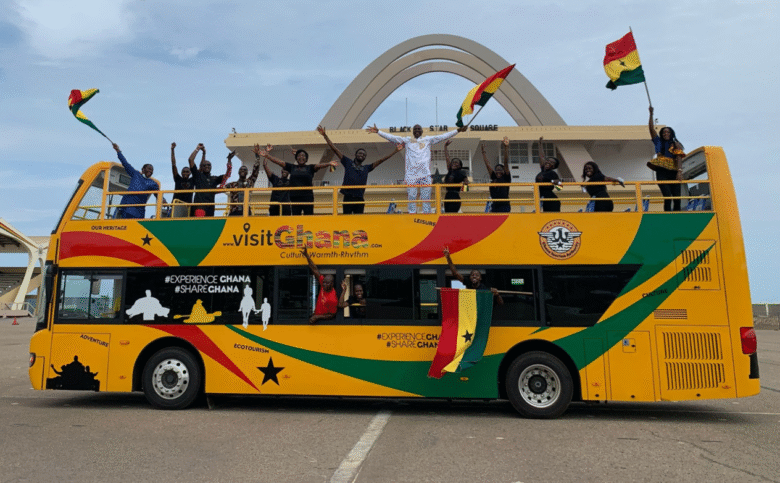Ghana has a diverse and evolving transportation network that connects cities, towns, and rural communities. Whether you’re planning to explore Accra, tour Cape Coast, or travel up north to Tamale or Bolgatanga, understanding your transport options will help you move safely, efficiently, and within budget.
This guide breaks down the main modes of transport in Ghana, including their costs, safety, comfort levels, and when to choose each one based on your itinerary.
Air Travel: For Long-Distance Domestic Routes
Ghana has a handful of reliable domestic airlines connecting major cities. Flying is the fastest (but most expensive) way to travel long distances, such as from Accra in the south to Tamale in the north.
Main Domestic Airports
- Kotoka International Airport (ACC) – Accra
- Kumasi International Airport (KMS) – Kumasi
- Tamale Airport (TML) – Tamale
- Takoradi Airport (TKD) – Takoradi
- Wa Airport (WZA) – Wa
Recommended Airlines
- Africa World Airlines (AWA)
- PassionAir
Pros
- Cuts down travel time significantly (e.g., Accra to Tamale: 1 hour vs. 12–14 hours by road)
- Suitable for business or tight schedules
Cons
- More expensive (USD $50–$150 one-way)
- Flights may be delayed or rescheduled due to weather or low demand
Ride-Hailing Apps: Reliable and Convenient in Cities
In major urban centers like Accra, Kumasi, and Takoradi, ride-hailing services offer a comfortable and secure option for visitors.
Popular Platforms
- Uber
- Bolt
- Yango (less common but available)
When to Use
- Traveling within cities
- Airport transfers
- Night-time trips when taxis may be less safe
Pricing
- Affordable compared to Western standards (USD $1–$10 per ride depending on distance)
- Transparent fare system
- No haggling required
Tip: Use mobile money to pay drivers and avoid carrying cash.
Metered and Shared Taxis
Taxis in Ghana operate in two primary ways: metered/private hire and shared (dropping) taxis.
Private Hire Taxis
- No meters; price must be negotiated upfront
- Widely available in cities and towns
- Often older vehicles without air conditioning
Advice: Ask locals about the fair fare to your destination before negotiating.
Shared Taxis
- Fixed routes with multiple passengers
- Cheaper but less comfortable
- No fixed schedules—vehicles depart when full
Cost Estimate
| Route Type | Estimated Fare (GHS) | USD Equivalent |
|---|---|---|
| Short city ride | GHS 15–40 | $1–$3 |
| Inter-city route | GHS 100–300 | $7–$20 |
Trotros: The Local Minibus Experience
Trotros are privately operated minivans that serve as the backbone of public transport in Ghana. They are the most cost-effective way to get around, but also the least comfortable.
Characteristics
- Operate on fixed routes
- Depart only when full
- Stop frequently to pick up and drop off passengers
- Fares are very low (often less than $1 per ride)
Pros
- Cheapest option available
- Widely accessible across cities and rural towns
Cons
- Cramped seating and no air conditioning
- Unpredictable schedules
- Minimal luggage space
Trotros are ideal for budget-conscious travelers or those seeking an authentic local experience, but they may not be suitable for long journeys with luggage.
Intercity Buses: Comfortable and Safer for Long Travel
For travel between major towns and cities, intercity bus services are a safe and reasonably priced option. They offer better comfort and safety than trotros or shared taxis, particularly for longer distances.
Major Bus Operators
- STC (State Transport Company) – Reliable and comfortable
- VIP Jeoun – Popular with locals and tourists
- OA Travel & Tours – Offers some luxury-class options
- Metro Mass Transit (MMT) – State-run, cheaper but less reliable
Comfort Classes
- Standard: Basic seating, no A/C
- Executive: A/C, reclining seats, onboard entertainment
Estimated Intercity Fares
| Route | Price (GHS) | Duration |
|---|---|---|
| Accra to Kumasi | 100–150 | 5–6 hours |
| Accra to Cape Coast | 70–120 | 3–4 hours |
| Accra to Tamale | 250–350 | 10–14 hours |
Booking Tips:
- Purchase tickets in advance during holidays and weekends
- Arrive at the terminal early to secure your seat
- STC and VIP have designated bus terminals in major cities
Car Rental and Self-Drive Options
Driving in Ghana gives you flexibility, especially when exploring remote or rural areas not well-served by public transport.
Rental Options
- Available through international companies (Avis, Europcar) or local agencies
- Cost: USD $60–$100 per day (excluding fuel and driver)
Documents Required
- Valid national driver’s license
- International Driver’s Permit (IDP)
- Passport and credit card
Road Conditions
- Urban roads are generally paved
- Rural roads can be potholed or unpaved
- Street lighting may be poor
- Road signs and GPS directions can be unreliable
Self-driving is recommended only for experienced drivers. Alternatively, you can hire a car with a local driver who knows the routes and road culture.
Motorbike and Bicycle Options
In cities like Tamale and parts of the Volta Region, motorbike taxis (known as okadas) are common. They are fast but come with higher risk.
Motorbike Taxis
- No helmets provided in many cases
- Not officially regulated
- Popular in traffic-heavy areas
Due to safety concerns and limited insurance coverage, okadas are not recommended for most foreign visitors.
Bicycles
- Practical for short distances in quieter towns
- Rentals may be available in tourist spots like Cape Coast or Lake Bosomtwe
Boats and Ferries
For travel along the Volta River or around Lake Volta, passenger boats and ferries offer scenic but slower alternatives.
Key Routes
- Akosombo to Yeji (multi-day journeys)
- Ada Foah boat rides
- Local fishing boats (short crossings)
Boating options are more recreational than practical for most travelers, though they can add a unique element to your itinerary.
Final Travel Safety Tips
- Avoid travel after dark, especially in rural areas
- Always carry a local SIM card with data for navigation and ride-hailing
- Use official bus terminals and reputable services
- Keep cash and valuables secure, especially on public transport
- Ask locals or hotel staff for reliable transport options before venturing out
Ghana’s transportation network may not be as structured as in some Western countries, but it’s manageable and adaptable with the right information. Whether you prioritize speed, budget, or cultural immersion, there is a transport option that fits your needs. By understanding the system and planning ahead, getting around Ghana can be both efficient and rewarding.




